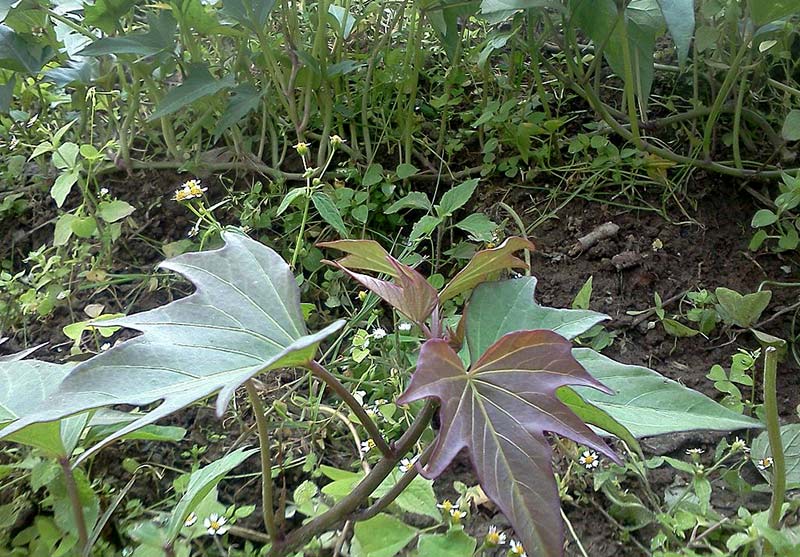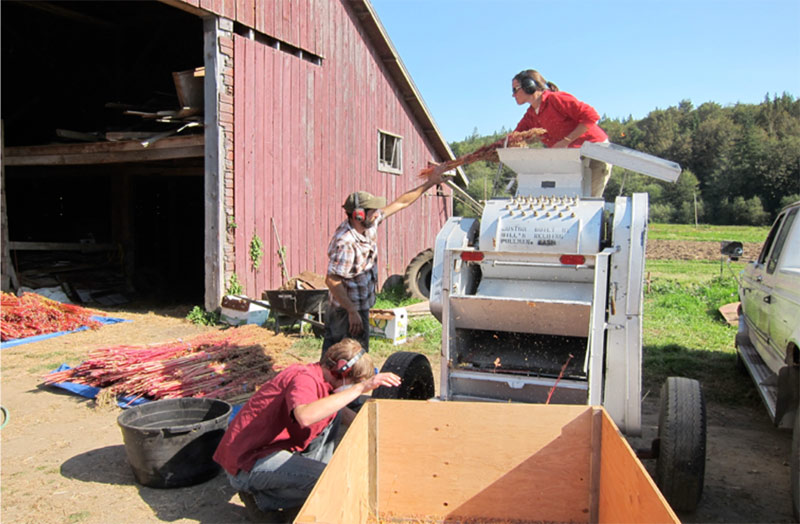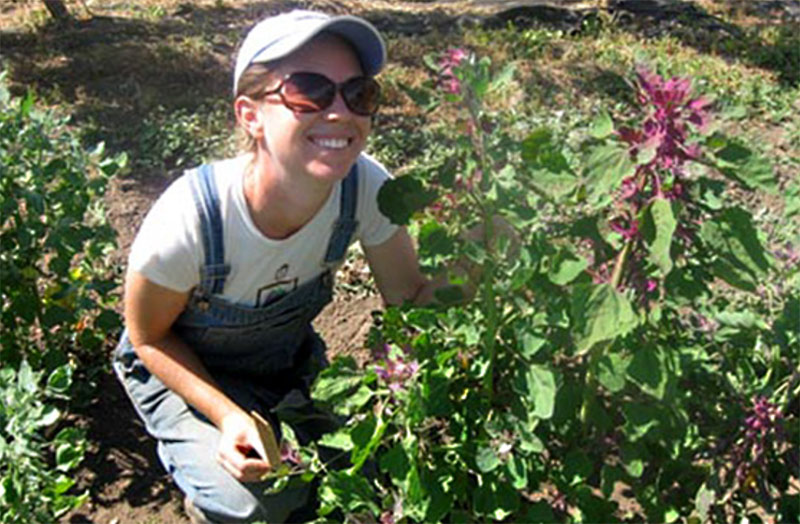 Nothing says summer like fresh picked sweet corn. That’s why organic farmers consider it crucial for attracting customers to their market stands and CSAs. However, farmers growing sweet corn in cool climates face unique challenges. They need varieties with superior cold germination, disease and pest resistance, early vigor to out-compete weeds, and of course, flavor.
Nothing says summer like fresh picked sweet corn. That’s why organic farmers consider it crucial for attracting customers to their market stands and CSAs. However, farmers growing sweet corn in cool climates face unique challenges. They need varieties with superior cold germination, disease and pest resistance, early vigor to out-compete weeds, and of course, flavor.
When Martin Diffley couldn’t find an organic sweet corn variety that would tolerate his Minnesota farm’s cool soils, he contacted Dr. Bill Tracy in the Department of Agronomy at the University of Wisconsin for help. The university was working on sweet corn breeding and the meeting with Diffley led to a grant proposal to OFRF requesting funding to conduct trials on Diffley’s farm. In 2008, OFRF awarded Tracy and his team a $14,795 grant for a participatory plant breeding project to improve sweet corn for organic farmers in cool climates. This initial grant led to several additional research projects with significant impacts in the world of organic seed breeding and an important research network that continues today.
The effect of OFRF’s grant program is like one kernel of corn. A single seed grows into multiple cobs and from there it grows organically and exponentially. From one seed arises the potential for so much sustenance.
Tracy worked with three organic farmers to evaluate a methodology for participatory plant breeding to improve farmer skills and involvement in on-farm breeding. The farmers who partnered with Tracy gained the skills to initiate and manage on-farm breeding projects themselves and have been sharing this knowledge with other growers through organic breeding workshops.

OFRF grants to researchers at the Organic Seed Alliance in Port Townsend, Washington in 2010 (Micaela Colley, $15,000) and 2011 (Jared Zystro, $12,000) funded the development of a toolkit to help farmers and researchers succeed in participatory organic plant breeding projects. Tracy and Diffley collaborated on both projects. Jim Myers at Oregon State University also collaborated on the research. The toolkit they developed is available at seedalliance.org.
OFRF grants paved the way for a new open-pollinated sweet corn variety called, “Who Gets Kissed?” that arrived on the market in 2014. This best-seller yields well, tolerates cool soils, resists common rust and corn smut, and is absolutely delicious. Because it’s an open-pollinated variety, growers can save and select seed from their “Who Gets Kissed?” harvests to adapt the variety to their own conditions and market needs.
The new variety is just one of the positive outcomes of the work that grew from OFRF’s initial grant.
Funding innovative work at the early stages becomes enhanced and very impactful when researchers are able to continue to work at a larger scale. Outcomes from the OFRF-funded projects helped leverage $2.3M in funding from USDA’s Organic Agriculture Research and Extension Initiative (OREI) to establish the Northern Vegetable Improvement Collaborative (NOVIC). The research collaborators include Dr. Bill Tracy and Dr. Erin Silva from the University of Wisconsin; Dr. Jim Myers and Lane Selman from Oregon State University; Laurie McKenzie, Micaela Colley, and Jared Zystro from Organic Seed Alliance, and Dr. Michael Mazourek from Cornell University. These researchers engage farmers around four hubs (OR, WA, WI, and NY) in breeding and trialing of a variety of vegetables. Results include a new multiple-disease-resistant tomato “Iron Lady,” several other vegetable varieties, increased markets for varieties that performed well in on-farm trials, as well as many advanced breeding lines with improved tolerance to temperature extremes and other desired traits.
| NOVIC Impacts |
| 2 New commercial organic varieties released |
| 8 Crops being developed for organic agriculture |
| 8 Graduate students trained in NOVIC who now work in the organic seed industry |
| 19 States reached with in-depth trainings |
| 40 States where new NOVIC organic varieties have been sold |
| 80 NOVIC events and presentations |
With another OREI grant of $2M, NOVIC II continues working to improve the profitability of organic farmers and the quality of organic produce for consumers.
 Public funding such as OREI—and private funding from organizations like OFRF—are critical to training the next generation of scientists and developing new talent.
Public funding such as OREI—and private funding from organizations like OFRF—are critical to training the next generation of scientists and developing new talent.
The future success of organic agriculture depends on breeders, who will work to develop new varieties for organic and low-external-input systems. Unfortunately, according to Rural Advancement International, public plant breeding programs have been reduced by a third in recent years. Three private firms now control more than half of the global seed market, up from 22 percent in 1996. This is troublesome as the private sector will focus mainly on researching and developing major commodity crops such as corn and soybeans, while ignoring more diversified crops such as fruits and vegetables.
Dr. Tracy and his colleague Dr. Erin Silva, an Organic and Sustainable Cropping Systems Specialist, recently spoke at a Congressional briefing in Washington, DC about the impact public investment in organic research is having on both organic and conventional farmers. Dr. Silva received a $20,000 grant from OFRF in 2016 to research how symbiotic microbes increase plants’ access to vital nutrients. Tracy and Silva join OFRF and other organic stakeholders in supporting the bipartisan Organic Agriculture Research Act, which would raise funding for OREI in the next Farm Bill from $20 million to $50 million annually.
For nearly three decades, OFRF has been at the forefront of the organic movement. Through our advocacy work we’ve helped shape policies and develop programs that support organic farmers. In 2017, OFRF awarded Tracy and his research team a grant of $3,588 to survey sweet corn growers in the U.S. about their strategies for managing corn earworm. The data will be shared in an extension publication and inform longer-term efforts of developing earwormresistant sweet corn cultivars for organic farmers. OFRF has invested $3.2 million in 337 grants. All of our research results and educational materials are available at ofrf.org







 Public funding such as OREI—and private funding from organizations like OFRF—are critical to training the next generation of scientists and developing new talent.
Public funding such as OREI—and private funding from organizations like OFRF—are critical to training the next generation of scientists and developing new talent. 
 On the second day, we were ready to get to work. The policies we discussed looked at how to solve a number of pressing issues that California faces—pesticide usage near schools, land preservation, beginner organic farmer support, organic research and training funding, and much more. Despite our diverse and sometimes conflicting perspectives, we came together as a group to find common ground and think through our differences.
On the second day, we were ready to get to work. The policies we discussed looked at how to solve a number of pressing issues that California faces—pesticide usage near schools, land preservation, beginner organic farmer support, organic research and training funding, and much more. Despite our diverse and sometimes conflicting perspectives, we came together as a group to find common ground and think through our differences.


 The pathogenic fungus Fusarium threatens the integrity of corn crops in the form of blights and by producing mycotoxins, which can affect human and animal health if they enter the food chain. Efforts to control its spread are complicated because the fungus often resides in seeds; however, biological control microorganisms offer a promising organic alternative to chemical seed treatments.
The pathogenic fungus Fusarium threatens the integrity of corn crops in the form of blights and by producing mycotoxins, which can affect human and animal health if they enter the food chain. Efforts to control its spread are complicated because the fungus often resides in seeds; however, biological control microorganisms offer a promising organic alternative to chemical seed treatments. While research into seedborne microbes is still in its infancy, Nebert and his team hope to generate more interest with the Community Research Network, which enables OP corn seed growers to submit seeds for microbial community analysis. To date, they have received 70 seed samples from over a dozen corn varieties, which are being processed in parallel with seed and crown samples from the OFRF funded experiment. This larger data set, which includes over 10 million DNA sequences, will enable Nebert to conduct broader experiments across cultivars, geographies and farming methods. The data will be shared freely online.
While research into seedborne microbes is still in its infancy, Nebert and his team hope to generate more interest with the Community Research Network, which enables OP corn seed growers to submit seeds for microbial community analysis. To date, they have received 70 seed samples from over a dozen corn varieties, which are being processed in parallel with seed and crown samples from the OFRF funded experiment. This larger data set, which includes over 10 million DNA sequences, will enable Nebert to conduct broader experiments across cultivars, geographies and farming methods. The data will be shared freely online. September 9, 2019 – On September 3rd, OFRF hosted a research field day at the UC Santa Cruz Farm & Garden. Researchers and others from UCSC joined OFRF to talk with Congressman Jimmy Panetta about the highly innovative organic research taking place there, throughout his district, and across the U.S.
September 9, 2019 – On September 3rd, OFRF hosted a research field day at the UC Santa Cruz Farm & Garden. Researchers and others from UCSC joined OFRF to talk with Congressman Jimmy Panetta about the highly innovative organic research taking place there, throughout his district, and across the U.S. Just twelve years ago the idea that you could grow strawberries without methyl bromide was very ingrained. Today, it’s a different story. The amount of strawberries grown organically in California has gone from 0% thirty years ago to 13% currently, and the good news is that percentage should continue to increase. “Fumigants are one of the biggest culprits in pesticide drift issues, from a human health perspective as well as an ecological perspective, reduced fumigant use is a good thing,” emphasizes Shennan. ASD is used on 2000 acres of strawberries in California and is being tested for its application in strawberry nurseries, apple, almond, vegetable, and flower production systems in the U.S.
Just twelve years ago the idea that you could grow strawberries without methyl bromide was very ingrained. Today, it’s a different story. The amount of strawberries grown organically in California has gone from 0% thirty years ago to 13% currently, and the good news is that percentage should continue to increase. “Fumigants are one of the biggest culprits in pesticide drift issues, from a human health perspective as well as an ecological perspective, reduced fumigant use is a good thing,” emphasizes Shennan. ASD is used on 2000 acres of strawberries in California and is being tested for its application in strawberry nurseries, apple, almond, vegetable, and flower production systems in the U.S.
 OGEE hit the beauty scene with a “bang,” receiving accolades from magazines ranging from Allure to Vogue. Although ecstatic with OGEE’s success, Stark believes the organic industry needs a bigger voice to accelerate change, especially in the world of cosmetics and beauty. “It is still impossible to source most of the organic ingredients that we need,” says Stark, “certified organic feedstocks are minimal or completely nonexistent. At the same time, the demand for organic crops has skyrocketed, while the percentage of organic farmland has remained flat.”
OGEE hit the beauty scene with a “bang,” receiving accolades from magazines ranging from Allure to Vogue. Although ecstatic with OGEE’s success, Stark believes the organic industry needs a bigger voice to accelerate change, especially in the world of cosmetics and beauty. “It is still impossible to source most of the organic ingredients that we need,” says Stark, “certified organic feedstocks are minimal or completely nonexistent. At the same time, the demand for organic crops has skyrocketed, while the percentage of organic farmland has remained flat.”
 August 27, 2019—It is now widely understood that living healthy soil provides the foundation for successful farming, and supports plant, animal, and human life. However, while the concept of “feeding the soil” has been around for a long time, for many it is still uncharted territory.
August 27, 2019—It is now widely understood that living healthy soil provides the foundation for successful farming, and supports plant, animal, and human life. However, while the concept of “feeding the soil” has been around for a long time, for many it is still uncharted territory.